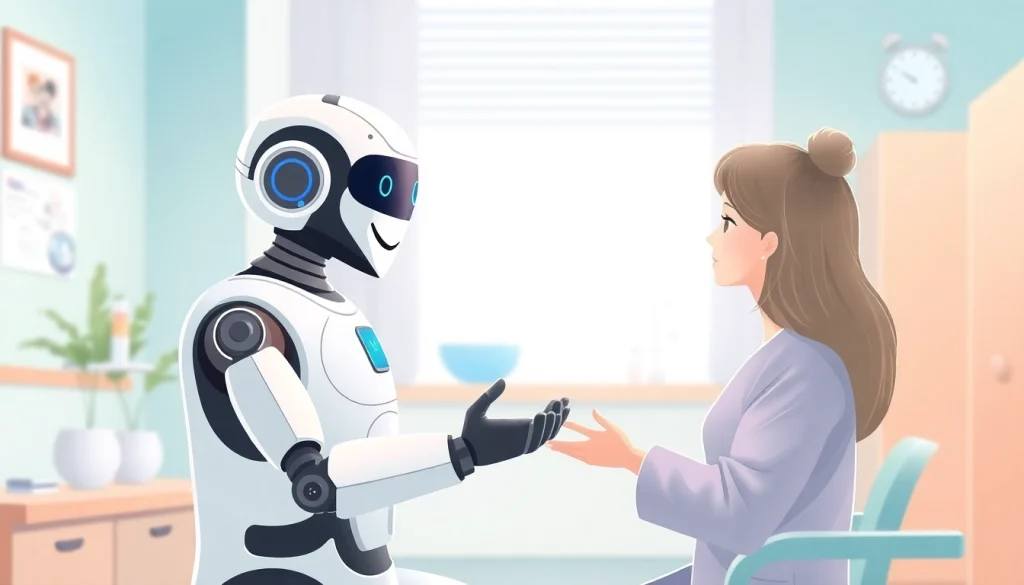
Understanding AI Healthcare Chat Bots
What Is an AI Healthcare Chat Bot?
Artificial Intelligence (AI) healthcare chatbots are digital assistants designed to facilitate communication between healthcare providers and patients. Utilizing natural language processing and machine learning, these chatbots can answer questions, provide medical information, schedule appointments, and assist with various healthcare tasks. They operate 24/7, providing patients with immediate responses to inquiries and helping manage the increasingly complex landscape of healthcare services effectively. By integrating an AI healthcare chat bot into their systems, healthcare organizations can streamline interactions and enhance patient engagement.
Key Features of AI Healthcare Chat Bots
The effectiveness of AI healthcare chatbots largely depends on several key features:
- Natural Language Processing (NLP): This technology enables chatbots to understand and interpret human language, allowing for more fluid, natural conversations.
- 24/7 Availability: Unlike human staff, chatbots are available around the clock, ensuring that patients can receive assistance whenever needed.
- Data Security: Advanced AI chatbots prioritize patient privacy, utilizing encryption and compliance with regulations such as HIPAA to protect sensitive information.
- Integration Capabilities: These bots can easily integrate with existing healthcare systems and platforms, allowing for seamless data flow and usability.
- Cost Efficiency: By automating routine tasks, chatbots can reduce the workloads of healthcare professionals, thereby cutting costs associated with administrative tasks and enabling more focus on quality care.
Benefits of Implementing AI in Healthcare
The introduction of AI chatbots into healthcare brings multiple benefits:
- Enhanced Patient Engagement: Chatbots provide timely responses to inquiries, leading to improved patient satisfaction and engagement.
- Improved Operational Efficiency: By handling routine inquiries, chatbots free up healthcare workers to focus on more complex and personalized patient care tasks.
- Data Collection and Analysis: Chatbots can gather valuable data regarding patient interactions, aiding healthcare providers in understanding patient needs and trends.
- Accessibility: For patients with disabilities or those living in remote areas, chatbots can provide essential information that they may not otherwise have access to.
Types of AI Healthcare Chat Bots
Clinical Chat Bots and Their Uses
Clinical chatbots play a vital role in modern healthcare. They assist in symptom analysis, triaging patients, and providing preliminary health advice based on user inputs. Some prominent applications include:
- Symptom Checkers: Tools like Ada Health and Buoy Health utilize algorithms to analyze symptoms and suggest possible ailments.
- Medication Management: Chatbots can send reminders for taking medications, reducing the chances of missed doses.
- Remote Monitoring: These bots can help track chronic conditions, reminding patients about check-ups or helping manage treatments from home.
Administrative Chat Bots for Healthcare Facilities
Administrative chatbots are designed to streamline operations within healthcare facilities. They can handle tasks such as appointment scheduling, billing inquiries, and patient follow-ups. Their applications include:
- Appointment Booking: Bots can manage schedules and reduce no-shows by sending appointment reminders.
- Insurance Queries: Chatbots can assist patients in understanding their coverage and processing claims.
- Patient Registration: Automating the patient registration process can enhance the efficiency of healthcare providers.
Chat Bots for Patient Education and Support
Educating patients about their health conditions is essential for effective management. AI chatbots can provide valuable resources by offering:
- Health Information: Chatbots can deliver information regarding specific diseases, treatments, and health tips personalized to the individual.
- Real-Time Support: Patients can ask questions and receive immediate support, improving their understanding and compliance with treatment protocols.
- Community Resources: These bots can direct users to community health services, support groups, and educational sessions.
Implementing an AI Healthcare Chat Bot
Steps for Successful Implementation
Successful implementation of an AI healthcare chatbot requires a systematic approach:
- Needs Assessment: Identify the specific needs of your healthcare organization and determine the tasks you want the chatbot to handle.
- Platform Selection: Choose a platform that aligns with your needs and has the capabilities to integrate with existing technologies.
- Designing Conversations: Develop a conversational design that mimics human interaction, ensuring a positive user experience.
- Testing: Conduct thorough testing to identify and troubleshoot any issues before full-scale deployment.
- Training Staff: Educate your staff on utilizing the chatbot and understanding its functionalities to maximize its benefits.
Customizing the Chat Bot for Your Needs
Personalizing the chatbot helps meet the specific requirements of your patient demographic. Considerations include:
- Language Preferences: Offer multilingual support to cater to a diverse patient base.
- Condition-Specific Protocols: Customize responses based on common conditions prevalent in the target population.
- User Interface: Design a meaningful and accessible interface that enhances user engagement.
Integrating with Existing Healthcare Systems
Effective integration with existing systems is critical for a chatbot’s success. Ensure that:
- Data Syncing: The chatbot should seamlessly sync and share data with your Electronic Health Record (EHR) systems.
- Interoperability: It is essential for the chatbot to communicate with other healthcare software like billing systems and appointment scheduling tools.
- Regulatory Compliance: Ensure that integration follows HIPAA and other relevant regulations to protect patient data.
Evaluating the Performance of AI Chat Bots
Metrics for Success in Chat Bot Deployment
Evaluating the effectiveness of an AI healthcare chatbot requires specific metrics, such as:
- User Engagement: Measure how many patients interact with the chatbot and the frequency of their interactions.
- Resolution Rate: Analyze the percentage of patient inquiries resolved without human intervention.
- Response Time: Track the average time taken for the chatbot to respond to inquiries, aiming for minimal delays.
Patient Feedback and Satisfaction
Regularly soliciting patient feedback helps improve chatbot functionality and user experience. Consider:
- Surveys: Post-interaction surveys can provide insights into patient satisfaction and areas needing improvement.
- User Ratings: Implementing a rating system for responses can help gauge performance and identify ongoing issues.
Continuous Improvement Strategies
To ensure that your AI chatbot remains effective, implement continuous improvement strategies such as:
- Regular Updates: Continuously update the chatbot’s knowledge base with new medical information and adjust based on patient inquiries.
- Performance Reviews: Conduct quarterly reviews of chatbot performance to assess its impact on patient care.
- Feedback Implementation: Act on feedback from both patients and staff to enhance the chatbot’s functionality and interface.
The Future of AI Healthcare Chat Bots
Emerging Trends in AI Technology
The advancements in AI technology hint towards remarkable trends that will shape the future of healthcare chatbots, including:
- Generative AI: Enhanced personalization capabilities, allowing bots to create custom responses based on patient history and preferences.
- Voice Integration: The rise of voice-activated chatbots, providing more natural interaction and accessibility for users.
- Emotional Intelligence: Future chatbots are likely to include features that recognize and respond to patient emotions, improving overall engagement.
Potential Challenges and Solutions
While the future looks promising, challenges may arise in the implementation of AI chatbots:
- Data Privacy: As chatbots gather sensitive patient data, ensuring robust privacy measures are paramount.
- Integration Issues: Ongoing technology compatibility may pose challenges; organizations should invest in flexible solutions.
- Patient Trust and Acceptance: Educating patients on the benefits of AI in healthcare can enhance trust and encourage usage.
What Lies Ahead for Healthcare Communication
The integration of AI chatbots in healthcare is set to transform communication. Expect innovations that enhance collaboration among healthcare providers and patients, focusing on a personalized care experience. The development of more sophisticated algorithms will allow for better assessments of patient health and even predictive analytics, leading to proactive care solutions.






